|
|
|
Sort Order |
|
|
|
Items / Page
|
|
|
|
|
|
|
| Srl | Item |
| 1 |
ID:
097135
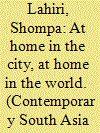

|
|
|
|
|
| Publication |
2010.
|
| Summary/Abstract |
This article considers the politics of urban belonging for a religious minority, Brahmos, in Kolkata, India, through the contradictory notions of cultural particularism and cosmopolitanism. In his concept of 'Cosmopolitan Patriotism', Kwame Appiah argues attachment to a home, 'with its own cultural particularities', can co-exist with 'taking pleasure from the presence of other different places that are home to other different people'. By building on Appiah's situated cosmopolitanism I analyse Brahmo attachments to the city of Kolkata, through the particularism of the middle-class Bengali city and its conceptual other, the cosmopolitan, classless, fraternal city. But rather than representing these local and global affiliations as disjunctive, I explore how such belongings can co-exist and destabilise.
|
|
|
|
|
|
|
|
|
|
|
|
|
|
|
|
| 2 |
ID:
169994
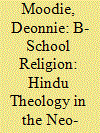

|
|
|
|
|
| Summary/Abstract |
In the industrial sector of Kolkata’s Salt Lake township, the spires, shikaras and domes of religious sites that are interspersed throughout the city proper are absent, and high-rise glass and metal buildings housing multinational corporations, hotels and shopping malls take their place. But religion is not absent there. Instead, management professors and business leaders transform those buildings into temples by framing the labour that takes place within them as a sacrificial act of worship. With this case study, I demonstrate that Hindu theologies are actively shaping and being reshaped by neo-liberal capitalism and its urban topologies.
|
|
|
|
|
|
|
|
|
|
|
|
|
|
|
|
| 3 |
ID:
177941
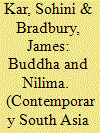

|
|
|
|
|
| Summary/Abstract |
This article explores the lives and careers of two people from left-leaning, political families in Kolkata. Their formative years and political horizons were shaped by the Left Front government in West Bengal (1977–2011), and they now negotiate the aftermath of the communists’ defeat in 2011 in their day-to-day lives. Buddha was born in Bangladesh, and is now a grassroots leader of the Communist Party of India (Marxist) in suburban Kolkata. His story encapsulates the struggle of building a political career in the aftermath of electoral defeat, mixing the pragmatism of being an important organizer or ‘party man’ with his commitment to cultural politics. Nilima is a young woman from a Leftist family employed by a microfinance institution (MFI). Her upbringing around the party and imbued with communist ideological values now conflicts with a thoroughly neoliberal workplace. Their experiences both in terms of their activism as well as their day-to-day experiences of work in Kolkata’s neighbourhoods offers insights into the contemporary political moment in the city after communism.
|
|
|
|
|
|
|
|
|
|
|
|
|
|
|
|
| 4 |
ID:
092418
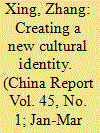

|
|
|
|
|
| Publication |
2009.
|
| Summary/Abstract |
Already in the nineteenth century, the Chinese immigrants had built several Chinese temples in Kolkata. These temples, including those dedicated to Tianhou and Guanyin, served not only as religious shrines but also meeting places for the community. This article outlines some of the unique, and hitherto unexamined, religious practices among the Kolkata Chinese. Specifically, it focuses on the venerations of the Atchew, perceived to be the first Chinese immigrant in India, the medium known as Lady Shou and the Indian Goddess Kali. While other religious beliefs among the Kolkata Chinese indicate the preservation of Chinese heritage and identity, these unique practices show the process of acculturation and the creation of a new mixed,Chinese-Indian identity.
|
|
|
|
|
|
|
|
|
|
|
|
|
|
|
|
| 5 |
ID:
146076
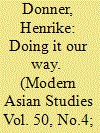

|
|
|
|
|
| Summary/Abstract |
With the exception of a few anthropologists working on gender, much of the recent literature on emerging intimate modernities in South Asia, and the middle class in India in particular, seems to support a view of social relationships evolving in a kind of linear development towards free choice, individualism, and identities based on sexual preference. This imagery is particularly prominent in the representation and self-representation of metropolitan, educated middle-class youths, whose views dominate popular media representations and are associated with secularism, individualism, and independence from family and community. In this article I argue that apart from the ostensibly overwhelming transformations that discourses on coupledom, love, choice and self-realization bring in their wake, new ways of choosing a spouse and of conducting conjugal relations among middle-class urbanites have to be interpreted in relation to much more subtle and long-standing social transformations as well as existing institutional forms, in particular the practical implications of patrilocality and the ideology and reality of the joint family. Based on fieldwork with Bengali-speaking middle-class families in Kolkata spanning two decades, the article charts continuities and subtle shifts in the way ‘love’ and ‘marriage’ are related in conversations, and how young women and their parents negotiate marriage in the context of middle-class consumerism, status competition, and uncertainty.
|
|
|
|
|
|
|
|
|
|
|
|
|
|
|
|
| 6 |
ID:
093202
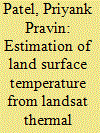

|
|
|
| 7 |
ID:
177943
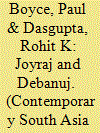

|
|
|
|
|
| Summary/Abstract |
In this article we want to evoke two characters that each suggest different points of departure for thinking about Kolkata as a queer kind of space. By this we want to evoke something of the sexual geography and life-ways of the city, but to go beyond this standpoint too, to question ways in which ethnographic characters might be evoked in respect of any context, Kolkata or elsewhere. In one sense this is to open out a perception of Kolkata as a scene of many sexual life-worlds, inviting a plural kind of analysis suggestive of a multiplicity of perspectives; persons/subjects each with a unique viewpoint to be captured. The two characters we explore here each draw attention to issues of belonging and migration, of both wanting to move to and away from Kolkata; creating new life-worlds via the city amidst its shifting sexual geographies, class and caste divisions, and wider diasporic connections and fault-lines. Kolkata itself emerges as an attribute of the characterisations to hand: sometimes as distinct mise-en-scene, at others a kind of sensibility or resonance field for understanding self and others.
|
|
|
|
|
|
|
|
|
|
|
|
|
|
|
|
| 8 |
ID:
120217
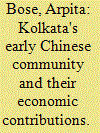

|
|
|
|
|
| Publication |
2013.
|
| Summary/Abstract |
It is not widely known that Chinese people have been living and working in Kolkata for more than 300 years. Successive earlier waves of Chinese migration to the city can be traced by historical research. While such a work is still in its infancy, later developments in economic and legal fields remain almost completely uncovered, too. This brief article provides a preliminary overview of Chinese migration and business activities, occupational characteristics and various contributions of this community to the economy of the city and places Chinese migration to Kolkata in a wider context. It offers some insights into how a foreign migrant population arrives in the first place, how it may organise itself and what varied contributions it may make over time to the new place of residence. Always on the fringes, in many ways, the Chinese of Kolkata have displayed typical resilience and business acumen, but have also encountered significant difficulties worth researching in more depth.
|
|
|
|
|
|
|
|
|
|
|
|
|
|
|
|
| 9 |
ID:
140126
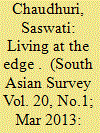

|
|
|
|
|
| Summary/Abstract |
The issue of poverty eradication, or poverty reduction, has been at the core of development economics over the years. There had been concerted efforts to reduce rural poverty, while urban poverty was given less priority by policy-makers. However, urban areas are not free of the maladies of poverty. Urbanisation of poverty has emerged as a new phenomenon. This article attempts to use the sustainable livelihood framework to analyse changes in the livelihood strategies of the poor in the city of Kolkata. The main objective of the article is to present primary data obtained in field study as well as critical analyses on social and economic situation of urban poor in Kolkata. Due to limitations in its scope, the article does not discuss slum policy and management aspects. This article focuses on urban poverty literature based on sociological, economic and policy dimensions and explores current thinking on these issues of urban poverty.
|
|
|
|
|
|
|
|
|
|
|
|
|
|
|
|
| 10 |
ID:
170671
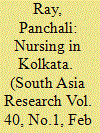

|
|
|
|
|
| Summary/Abstract |
Research on ‘care work’ tends to focus on relations between gender and ‘care’ at the cost of obfuscating caste and class markings that devalue such labour. This article argues that the service work of the contemporary nursing profession, as observed in Kolkata, continues to be devalued, not because it is care work but because it is linked to low-caste/out-caste women who have historically provided nursing care. To counter such stigma, nursing has witnessed a splintering along the lines of ‘prestigious’ and ‘dirty’ work. This cleavage, based on historically and socially produced structural inequalities, is supported both by organisational strategies and a privileged section of workers, who deploy ‘merit’ or cultural capital to close ranks against others. The article examines how women located at the bottom of this hierarchy resist such strategies. What does ritual, banal everyday resistance imply for processes and practices that reproduce organisational inequalities?
|
|
|
|
|
|
|
|
|
|
|
|
|
|
|
|
| 11 |
ID:
177939
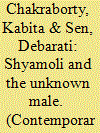

|
|
|
|
|
| Summary/Abstract |
This article explores the spectrum of violence inflicted and endured by marginalized young people in Kolkata. An unknown youth (possibly a male acquaintance encountered in the first research site in the bustees, or slum communities of Kolkata) and a young girl Shyamoli (the central character in the fictional piece set in a small town or moforshol on the outskirts of Kolkata) present a picture of the ordinary and everyday gendered and class violence experienced by girls and young women in a rapidly changing Kolkata. Collectively the two papers remind us of the aspirational politics, practices, and affective states that lead to violent outcomes in patriarchal and increasingly middle-class nationalist spaces. As fieldworkers we advocate for reflexive sensitivity and nuanced commitment to embracing contradictions and ambiguity wholeheartedly as we think through the aspirations, practices, and experiences of our interlocutors in Kolkata’s shadow zones.
|
|
|
|
|
|
|
|
|
|
|
|
|
|
|
|
| 12 |
ID:
108919
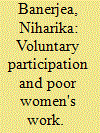

|
|
|
|
|
| Publication |
2011.
|
| Summary/Abstract |
Voluntary participation is a development practice that incorporates and 'empowers' marginalized populations by recruiting them as volunteers in community improvement programs in the global south. In India, non-governmental organizations (NGOs) commonly recruit female volunteers in urban slums to 'participate' in the improvement of reproductive and child health care needs in the community. In the volunteering literature, the practice is examined as one which uses the unpaid labor of women and legitimizes it within discourses of citizenship and solidarity in declining welfare states in the global north. The dynamics of female volunteering in countries such as India has received little attention in this literature. With a focus on a reproductive and child health care program run by Hope, an Indian NGO, my article undertakes the following. First, I argue that in the Indian context, volunteering needs to be situated within a broader project of decentralizing the traditional authority of the development expert in top-down initiatives. Second, I demonstrate that female volunteering is practiced through stereotypical images of economically marginalized women's work. The article suggests that the volunteering strategy needs to be rethought as it fails to address the social and material realities within which urban poor women work and live in the global south.
|
|
|
|
|
|
|
|
|
|
|
|
|
|
|
|
| 13 |
ID:
170269
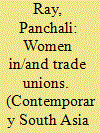

|
|
|
|
|
| Summary/Abstract |
This essay draws from an ethnographic study on nurses and attendants in the city of Kolkata to re-turn to the question of women’s consciousness and agency. I trace women’s reluctance to participate in union activities both to the failure of formal mechanisms of collective bargaining in representing workers’ interests, and to gendered norms that come in the way of organizing women workers. I explore how the performance of respectable femininity, legitimized by class and caste norms, inhibits women’s participation in intensely politicized masculine domains. Though at first glance it may seem that women’s reluctance to participate in union activities is gender neutral, I demonstrate that gender norms produce a social field that denies women political agency.
|
|
|
|
|
|
|
|
|
|
|
|
|
|
|
|
|
|
|
|
|